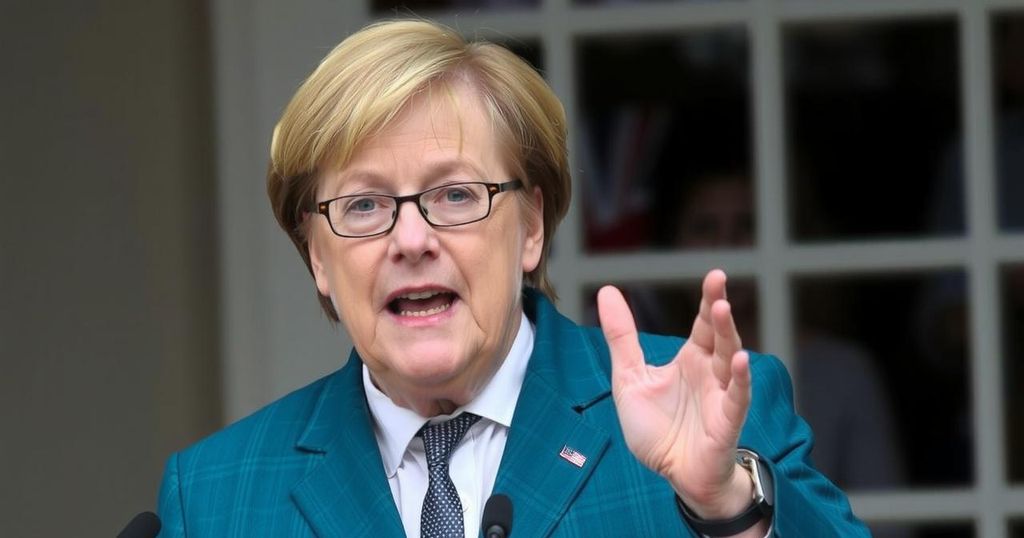World news
AFD, ALTERNATIVE FOR GERMANY, ASIA, BELLEVUE PALACE, BERLIN, CHRISTIAN LINDNER, DEMONSTRATIONS, ELON MUSK, EUROPE, FREE DEMOCRATS, FRIEDRICH MERZ, GERMANY, GOVERNMENT, MIDDLE EAST, OPPOSITION CRITICISM, POLITICS, POPULISM, SAUDI ARABIA, SCHOLZ, SOCIAL DEMOCRAT, TALE, UKRAINE
Marisol Gonzalez
0 Comments
German President Announced Snap Elections Following Parliamentary Dissolution
German President Frank-Walter Steinmeier has dissolved parliament and called for snap elections on February 23 following Chancellor Olaf Scholz’s confidence vote loss. Steinmeier urged for a fair election process, emphasizing the need for effective governance amidst rising tensions related to security and immigration. Polls indicate growing support for conservative challenger Friedrich Merz, complicating potential coalitions due to the presence of the far-right AfD.
In a significant political development, German President Frank-Walter Steinmeier has officially dissolved the parliament and confirmed the scheduling of snap elections for February 23. This decision follows Chancellor Olaf Scholz’s recent loss of a confidence vote, which stemmed from a breakdown in his coalition government after the exit of Finance Minister Christian Lindner’s Free Democrats. Amid rising turmoil, Scholz will continue to serve as caretaker chancellor until a new government is established.
President Steinmeier addressed the nation from Bellevue Palace, emphasizing the urgent need for a stable and effective government, stating that the country requires “a government capable of acting” and “reliable majorities in parliament” to navigate the ongoing difficulties. He also raised concerns regarding the integrity of the upcoming election campaign, specifically admonishing against “foreign influence,” including referencing the potential impact of social media platforms.
The political atmosphere is tense following a tragic incident at a Christmas market, which has intensified discussions surrounding security and immigration policies. The perpetrator, Taleb al-Abdulmohse, a psychiatrist originally from Saudi Arabia, was linked to the far-right Alternative for Germany (AfD) party, heightening fears regarding extremism. The president insisted that “hatred and violence must have no place in this election campaign,” reflecting the sensitive nature of the current sociopolitical climate.
Polling data indicates that conservative challenger Friedrich Merz leads significantly over Scholz’s Social Democrats, with mainstream parties hesitant to collaborate with the AfD, complicating the potential for stable coalitions. Consequently, Steinmeier called upon political entities and voters to prioritize effective problem-solving in governance as they prepare for the upcoming elections.
Recent events have precipitated a political crisis in Germany, highlighted by Chancellor Olaf Scholz’s loss of a confidence vote, which has now led to the dissolution of the parliament by President Frank-Walter Steinmeier. Scholz’s government was critically affected following the departure of a key coalition partner. The forthcoming snap elections are set against a backdrop of rising concerns about security, exacerbated by a violent incident at a Christmas market that has reignited debates on immigration and far-right extremism in Germany.
The dissolution of the Bundestag marks a pivotal moment in German politics, as the country prepares for snap elections amid significant challenges. With President Steinmeier advocating for a fair electoral process devoid of hatred and foreign meddling, the outcome could redefine the political landscape. Furthermore, the presence of the AfD and rising conservative support suggest that the formation of a stable government may prove increasingly complex in the future.
Original Source: www.aljazeera.com




Post Comment